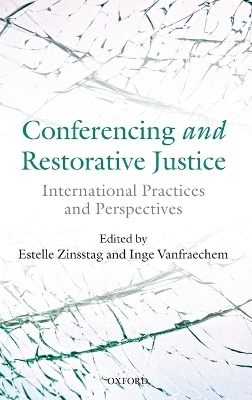
Conferencing and Restorative Justice
Oxford University Press (Verlag)
978-0-19-965503-8 (ISBN)
Conferencing and Restorative Justice: International Practices and Perspectives offers an analysis of conferencing practices around the world, examining the range of approaches to different types of crimes and offender age groups, and assessing their outcomes.
First developed in New Zealand and Australia in the 1990s, conferencing is a restorative justice practice which has since spread to a number of other countries as an effective tool in crime reduction. By encouraging the offender, the victim(s) and family members, and a facilitator to meet and discuss the crime and its consequences, and then to find a just and acceptable outcome for all, those involved hope to repair the harm inflicted upon the victim, the community and society in general. In this book, the editors have drawn together some of the leading figures in the restorative justice community to look at the current condition of such practices, particularly internationally, and to analyse the processes and outcomes of conferencing, compared with the European-favoured, victim-offender mediation.
With fourteen chapters featuring a mix of contributors, including both practitioners and academics, the book begins with a general and thematic overview of what conferencing is and how it is developing theoretically and in practice. This discussion then moves on to some of the original models of conferencing, such as in New Zealand and Australia, and examines some of the challenges (sexual assault cases) and the newer developments found in conferencing in Latin-America. The final section of the book consists of European perspectives on conferencing, exploring how some countries have developed conferencing more extensively (such as into the juvenile justice system), others are still in a starting-phase, whilst some have move conferencing outside of the justice system entirely. Impeccably researched and thoughtfully presented, Conferencing and Restorative Justice will be of interest to anyone involved in restorative justice practices, criminal justice and public policy.
Estelle Zinsstag is a senior researcher working on the European FP7 research project ALTERNATIVE. She has joined the Leuven Institute of Criminology in 2008 first as an affiliate, and then as a project officer for the European Forum for Restorative Justice to lead a 2 year research project funded by the European Commission and entitled 'Conferencing: a way forward for restorative justice in Europe', which ended in 2011. She publishes in the areas of sexual violence, transitional justice and restorative justice. Inge Vanfraechem is project manager at the Leuven Institute of Criminology (KU Leuven, Belgium) of the European FP7 project ALTERNATIVE, which concerns security and restorative justice in intercultural settings. Previously, she has worked as a researcher at the National Institute of Criminal Sciences and Criminology (Ministry of Justice, Belgium) on the evaluation of national victim policy, and as a project coordinator with the European Forum for Restorative Justice on Victims and restorative justice. She publishes on restorative justice and victimology.
1. Conferencing: Setting the scene ; PART 1: CONFERENCING: BROADENING THE SCOPE OF RESTORATIVE JUSTICE ; 2. Conferencing: A developing restorative justice practice ; 3. The need for clarity about restorative justice conferences ; 4. Comparing conferencing and mediation: Some evaluation results internationally ; 5. 'That's how the light gets in': Facilitating restorative conferences ; 6. Conferencing and victims ; PART 2: CONFERENCING: INCEPTION, CHALLENGES, AND NEWER DEVELOPMENTS ; 7. Revolution, decline, and renewal: Restorative youth justice in New Zealand ; 8. Conferences and gendered violence: Practices, politics, and evidence ; 9. Decentralization and privatization: The promise and challenges of restorative justice in the United States ; 10. Conferencing in South America as an exercise of democracy? An exploration of the 'vertical' role of restorative justice ; PART 3: CONFERENCING: EUROPEAN PERSPECTIVES ; 11. Conferencing in Northern Ireland: Implementing restorative justice at the core of the criminal justice system ; 12. Conferencing at the crossroads between rehabilitation and restorative justice ; 13. Restorative justice in the welfare state: Conferencing in the Nordic countries ; 14. Most things look better when arranged in a circle - Family Group Conferencing empowers societal developments in The Netherlands ; 15. Conferencing: Conclusions and way forward
| Zusatzinfo | 10 illustrations |
|---|---|
| Verlagsort | Oxford |
| Sprache | englisch |
| Maße | 162 x 236 mm |
| Gewicht | 560 g |
| Themenwelt | Recht / Steuern ► EU / Internationales Recht |
| Recht / Steuern ► Strafrecht ► Kriminologie | |
| Recht / Steuern ► Strafrecht ► Strafverfahrensrecht | |
| Sozialwissenschaften ► Soziologie | |
| ISBN-10 | 0-19-965503-0 / 0199655030 |
| ISBN-13 | 978-0-19-965503-8 / 9780199655038 |
| Zustand | Neuware |
| Haben Sie eine Frage zum Produkt? |
aus dem Bereich


